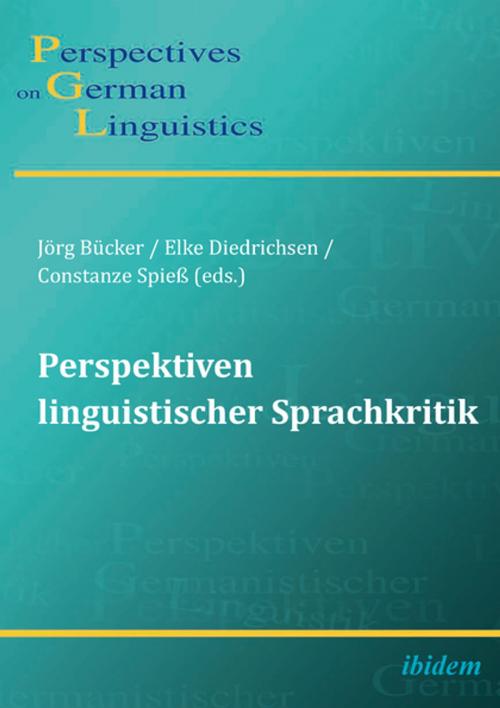Perspektiven linguistischer Sprachkritik
Nonfiction, Reference & Language, Language Arts, Study & Teaching| Author: | ISBN: | 9783838268088 | |
| Publisher: | Ibidem Press | Publication: | August 1, 2015 |
| Imprint: | Ibidem Press | Language: | English |
| Author: | |
| ISBN: | 9783838268088 |
| Publisher: | Ibidem Press |
| Publication: | August 1, 2015 |
| Imprint: | Ibidem Press |
| Language: | English |
This volume provides a collection of new perspectives on linguistic aspects of language criticism. It aims to offer a systematic account of the linguistic dimensions of all complex actions and discourses that can be the subject of critical language theory, which tries to link language and society. In contrast to conventional language criticism, the linguistic branch builds its conditions on the basis of a systemic analysis of its objects of inquiry. Its main goal is the formation of a linguistic awareness regarding the criterion of appropriateness with view of situational, contextual, and cultural factors.
The contributions in this volume reflect the multitude of different factors of and interrelations between linguistic aspects of language criticism. They show the extent to which critical linguistic practices impact societal issues and discourses but also how they function in everyday and institutional contexts such as new media and face-to-face interactions. They also discuss the didactic challenges and opportunities that come with the teaching of language criticism in schools and universities.This book is primarily aimed at linguists as well as lecturers and teachers but also at general readers interested in all aspects of language criticism.
This volume provides a collection of new perspectives on linguistic aspects of language criticism. It aims to offer a systematic account of the linguistic dimensions of all complex actions and discourses that can be the subject of critical language theory, which tries to link language and society. In contrast to conventional language criticism, the linguistic branch builds its conditions on the basis of a systemic analysis of its objects of inquiry. Its main goal is the formation of a linguistic awareness regarding the criterion of appropriateness with view of situational, contextual, and cultural factors.
The contributions in this volume reflect the multitude of different factors of and interrelations between linguistic aspects of language criticism. They show the extent to which critical linguistic practices impact societal issues and discourses but also how they function in everyday and institutional contexts such as new media and face-to-face interactions. They also discuss the didactic challenges and opportunities that come with the teaching of language criticism in schools and universities.This book is primarily aimed at linguists as well as lecturers and teachers but also at general readers interested in all aspects of language criticism.


![Cover of the book Erzähltextanalyse [German-language Edition] by](https://www.kuoky.com/images/2015/march/300x300/9783838267197-ez2R_300x.jpg)












